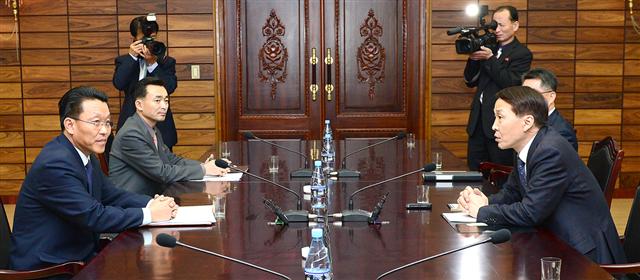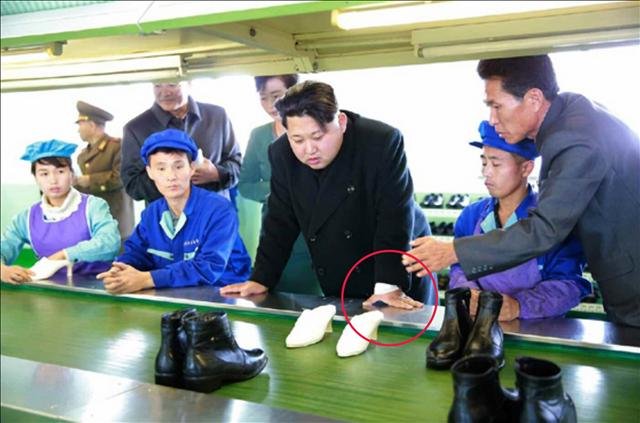Two sides have initially shown signs of flexibility, but details of chief delegates and agenda still need to be worked out
 |
Kim Ki-woong, inter-Korean talks office chief with South Korea’s Ministry of Unification (right) meets with North Korean CPRK secretariat department director Hwang Chol on the northern side of Panmunjeom Peace Village, in preparation for inter-governmental meetings next month, Nov. 26. (provided by the Ministry of Unification) |
With North and South Korea agreeing to hold talks at the vice minister level at the Kaesong Industrial Complex on Dec. 11 in order to discuss “pressing issues in the improvement of inter-Korean relations”, the next question is whether this will lead to progress in inter-Korean relations.
On Nov. 26, the two sides agreed to hold vice minister-level negotiations in a working-level meeting on the northern side of Panmunjeom that lasted until midnight.
The upcoming negotiations, which will bring together delegations headed by vice minister-level officials, will be a sequel to the “two plus two” talks that culminated in the Aug. 25 Agreement.
In the previous talks, South Korea was represented by National Security Office Chief Kim Kwan-jin and Unification Minister Hong Yong-pyo, while North Korea was represented by General Political Bureau Chief Hwang Pyong-so and KWP Secretary Kim Yang-gon.
Most notably, North and South Korean officials defied the expectations of experts and the media by deciding that the delegations to the talks would be led by vice minister-level officials.
This seems to have been a lesson learned from inter-Korean talks in June 2013, which failed to reach an agreement about high-level talks after an unprecedented disagreement about rank.
North Korea, which was first to present its basic statement in the working-level talks, suggested having vice minister-level officials lead the delegations, and South Korea prepared and presented an identical proposal. Both sides, it turned out, were on the same page. This flexibility by both parties bodes well for the high-level talks.
But they are not out of the woods yet. “In order to make a final decision on the chief delegates, there will need to be preliminary deliberations and approval from both sides,” a senior official with South Korea’s Unification Ministry said.
This suggests that, since the two governments are organized in different ways, there could conceivably be another round of quarrelling about rank, or in other words whether the delegations are led by the appropriate officials.
The working-level negotiators came to the broad agreement that the agenda of the high-level negotiations should include “pressing issues in the improvement of inter-Korean relations.”
The items that South Korea would most like to see on the agenda are seeking a fundamental solution to the issues of the families divided by the Korean War – such as holding reunions for those families – and discussing ways to implement the “three channels” of quality of life, environment, and culture laid out in the Dresden Declaration.
In Mar. 2014, South Korean President Park Geun-hye delivered the Dresden Declaration, in which she laid out a plan for the peaceful reunification of the Korean Peninsula.
The agenda items that are the greatest priority for North Korea are resuming tourism to Mt. Keumkang and revoking the May 24 Measures, a series of sanctions against North Korea put in place after the 2010 sinking of the Cheonan warship. However, North Korea did not directly mention the May 24 Measures during this round of working-level talks, the Unification Ministry said.
What North Korea mentioned instead were the sixth clause in the Aug. 25 Agreement about promoting private-sector exchange in various areas. North Korean officials emphasized their interest in promoting cooperation and exchange starting in relatively uncontroversial areas such as sports, according to a source familiar with the talks.
North Korea’s approach seems to be that, though the South Korean government may be unable to lift the May 24 Measures because of domestic political pressure, it may still be possible to move forward on cooperation and exchange in non-political areas. This would lay the groundwork for officially lifting the measures, which technically ban all forms of cooperation and exchange.
Nevertheless, there is a large gap between the agendas that the two sides have in mind. First of all, North Korea has expressed strong opposition to the Dresden Declaration, which it regards as a scheme for unification by absorption. Meanwhile, South Korea has not made any moves toward resuming tours to Mt. Keumkang or lifting the May 24 Measures.
Furthermore, South Korean government officials have firmly stated that reunions of the divided families and tours at Mt. Keumkang are not items that can be swapped for each other.
But if, during the first round of high-level talks, the two sides reach an agreement about holding reunions for the divided families and expanding cooperation and exchange in sports and other areas, this could pave the way for continuing the high-level talks and tackling more difficult topics in the future.
“While it’s being flexible, the government should raise the stakes of the talks by boldly putting Mt. Keumkang tours or the May 24 Measures on the table. It should be aiming for a more comprehensive agreement,” said Jeong Se-hyun, co-director of the Korea Peace Forum and former Unification Minister.
While the two sides agreed that the delegation heads – which were expected to be the biggest obstacle to the high-level talks – would be vice minister in rank, they have yet to agree on the specific figures. Deliberations on this issue will have to continue next week via the Panmunjeom liaison office.
For South Korea, the leading contender for delegation head is Hwang Boo-gi, Vice Minister of Unification. Hwang previously directed the contact support team for an office at the Ministry in charge of inter-Korean dialogue, and he was also the first director of the office for deliberations about economic cooperation at the Kaesong Industrial Complex.
It is very likely that the South Korean government had been thinking of appointing the Vice Minister of Unification to head the team of negotiators all along. “We’ve basically already chosen our delegation head. Before making the final decision, though, we’ll have to wait for North Korea’s proposal and discuss that with them,” said a key government official on Nov. 27.
Depending on how North Korea responds, the delegation might instead be led by Cho Tae-yong, Deputy Chief of the Blue House’s National Security Office, or Kim Kyou-hyun, Presidential Secretary for Foreign Affairs and Security.
Cho is a veteran diplomat who served as the chief envoy to the six-party talks and as the Vice Minister of Unification, but one downside is that he has no experience in inter-Korean talks.
In Feb. 2014, while Kim Kyu-hyun was Deputy Chief of the National Security Office, he represented the South Korean delegation in high-level talks with North Korea at Panmunjeom. Kim’s official rank is vice minister according to the organizational chart, but he is closer to a minister in his actual influence and is also one of President Park’s closest aides. This makes it unlikely that he will lead the delegation, government officials explained.
 |
As North Korean leader Kim Jong-un observes a shoe factory in Wonsan, he was seen with what appears to be a bandage on his left wrist, in this photograph from the Nov. 27 edition of the Rodong Sinmun newspaper. (Yonhap News) |
By Kim Jin-cheol and Lee Jeong-hun, staff reporters
Please direct questions or comments to [english@hani.co.kr]





